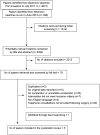Telephone consultations in place of face to face out-patient consultations for patients discharged from hospital following surgery: a systematic review
- PMID: 23561005
- PMCID: PMC3626714
- DOI: 10.1186/1472-6963-13-128
Telephone consultations in place of face to face out-patient consultations for patients discharged from hospital following surgery: a systematic review
Abstract
Background: Routine follow-up following uncomplicated surgery is being delivered by telephone in some settings. Telephone consultations may be preferable to patients and improve outpatient resource use. We aimed to compare the effectiveness of telephone consultations with face to face follow-up consultations, in patients discharged from hospital following surgery.
Methods: Seven electronic databases (including Medline, Embase and PsycINFO) were searched from inception to July 2011. Comparative studies of any design in which routine follow-up via telephone was compared with face to face consultation in patients discharged from hospital after surgery were included. Study selection, data extraction and quality appraisal were performed independently by two reviewers with consensus reached by discussion and involvement of a third reviewer where necessary.
Results: Five papers (four studies; 865 adults) met the inclusion criteria. The studies were of low methodological quality and reported dissimilar outcomes precluding any formal synthesis.
Conclusions: There has been very little comparative evaluation of different methods of routine follow-up care in patients discharged from hospital following surgery. Further work is needed to establish a role for telephone consultation in this patient group.
Similar articles
-
Telephone interventions for symptom management in adults with cancer.Cochrane Database Syst Rev. 2020 Jun 2;6(6):CD007568. doi: 10.1002/14651858.CD007568.pub2. Cochrane Database Syst Rev. 2020. PMID: 32483832 Free PMC article.
-
The role of telephone clinics in ENT.J Laryngol Otol. 2023 Aug;137(8):914-920. doi: 10.1017/S0022215123000129. Epub 2023 Feb 8. J Laryngol Otol. 2023. PMID: 36751912
-
A review of telephone consultations for head and neck cancer follow up: a patient satisfaction survey.J Laryngol Otol. 2021 Sep;135(9):815-819. doi: 10.1017/S0022215121001997. Epub 2021 Jul 23. J Laryngol Otol. 2021. PMID: 34294168
-
Telephone follow-up after day case tension-free vaginal tape insertion.Int Urogynecol J. 2016 May;27(5):787-90. doi: 10.1007/s00192-015-2891-6. Epub 2015 Nov 21. Int Urogynecol J. 2016. PMID: 26590807
-
Virtual outreach: a randomised controlled trial and economic evaluation of joint teleconferenced medical consultations.Health Technol Assess. 2004 Dec;8(50):1-106, iii-iv. doi: 10.3310/hta8500. Health Technol Assess. 2004. PMID: 15546515 Review.
Cited by
-
Can Teledentistry Replace Conventional Clinical Follow-Up Care for Minor Dental Surgery? A Prospective Randomized Clinical Trial.Int J Environ Res Public Health. 2022 Mar 15;19(6):3444. doi: 10.3390/ijerph19063444. Int J Environ Res Public Health. 2022. PMID: 35329133 Free PMC article. Clinical Trial.
-
Implementation of a Ureteric Colic Telemedicine Service: A Mixed Methods Quality Improvement Study.Urology. 2021 Jan;147:14-20. doi: 10.1016/j.urology.2020.10.010. Epub 2020 Oct 20. Urology. 2021. PMID: 33091386 Free PMC article.
-
Systematic review of cost-effectiveness analysis of behavior change communication apps: Assessment of key methods.Digit Health. 2021 Mar 26;7:20552076211000559. doi: 10.1177/20552076211000559. eCollection 2021 Jan-Dec. Digit Health. 2021. PMID: 35173977 Free PMC article. Review.
-
Effects of telephone follow-up on blood glucose levels and postpartum screening in mothers with Gestational Diabetes Mellitus.Med J Islam Repub Iran. 2015 Aug 22;29:249. eCollection 2015. Med J Islam Repub Iran. 2015. PMID: 26793640 Free PMC article.
-
Remote follow-up after cataract surgery (CORE-RCT): study protocol of a randomized controlled trial.BMC Ophthalmol. 2023 Jan 30;23(1):41. doi: 10.1186/s12886-023-02779-7. BMC Ophthalmol. 2023. PMID: 36717799 Free PMC article.
References
-
- Hennessy D, Connolly S, Lennon G, Quinlan D, Mulvin D. Out-patient management and non-attendance in the current economic climate. How best to manage our resources? Ir Med J. 2010;103(3):80–82. - PubMed
Publication types
MeSH terms
LinkOut - more resources
Full Text Sources
Other Literature Sources
Medical
Miscellaneous


